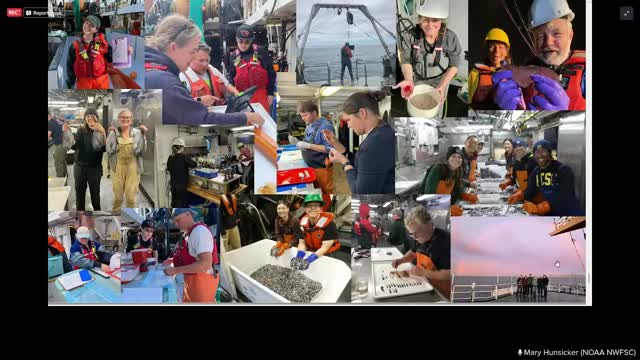Oregon's Citizen Science Round Table receives praise from Newport representative
March 08, 2025 | Fishery Management Council, Pacific, Governor's Office - Boards & Commissions, Executive, Washington
This article was created by AI summarizing key points discussed. AI makes mistakes, so for full details and context, please refer to the video of the full meeting. Please report any errors so we can fix them. Report an error »

In a room filled with the soft buzz of conversation, members of the Pacific Fishery Management Council gathered to discuss vital updates on marine research and its implications for local fisheries. The atmosphere was one of collaboration and appreciation, particularly as Dr. Hunsicker and Dr. Lizzie presented their comprehensive report on climate impacts and fisheries management.
Council member Van Mattis expressed gratitude for the clarity of the presentation, noting how the complex information was made accessible even to those without a background in oceanography or climate modeling. “It’s a lot of information in a short space,” he remarked, highlighting the importance of effective communication in fostering understanding among diverse stakeholders.
The discussion also touched on the significance of community engagement, with Van Mattis praising the outreach efforts to fishermen and industry members through citizen science initiatives. This approach not only enriches the data collected but also strengthens the bond between scientists and the fishing community. “I heard a lot of positive feedback,” he shared, reflecting the enthusiasm for continued collaboration.
Additionally, the inclusion of Dr. Rasmussen’s work on larval crab indices was acknowledged as a valuable contribution, although Van Mattis suggested that further refinement could enhance its utility. The long-term datasets from the Oregon Department of Fish and Wildlife (ODFW) and the Oregon Institute of Marine Biology (OIMB) were noted as essential resources for future research.
As the meeting progressed, the camaraderie among council members was palpable, with light-hearted moments breaking the seriousness of the discussions. Van Mattis humorously mentioned that the engaging presentation had even made him hungry for a hamburger, a testament to the lively atmosphere that permeated the meeting.
In conclusion, the council's commitment to refining their reports and fostering community involvement signals a proactive approach to managing the challenges facing Pacific fisheries. As they continue to navigate the complexities of marine ecosystems, the collaboration between scientists and local stakeholders will be crucial in shaping sustainable practices for the future.
Council member Van Mattis expressed gratitude for the clarity of the presentation, noting how the complex information was made accessible even to those without a background in oceanography or climate modeling. “It’s a lot of information in a short space,” he remarked, highlighting the importance of effective communication in fostering understanding among diverse stakeholders.
The discussion also touched on the significance of community engagement, with Van Mattis praising the outreach efforts to fishermen and industry members through citizen science initiatives. This approach not only enriches the data collected but also strengthens the bond between scientists and the fishing community. “I heard a lot of positive feedback,” he shared, reflecting the enthusiasm for continued collaboration.
Additionally, the inclusion of Dr. Rasmussen’s work on larval crab indices was acknowledged as a valuable contribution, although Van Mattis suggested that further refinement could enhance its utility. The long-term datasets from the Oregon Department of Fish and Wildlife (ODFW) and the Oregon Institute of Marine Biology (OIMB) were noted as essential resources for future research.
As the meeting progressed, the camaraderie among council members was palpable, with light-hearted moments breaking the seriousness of the discussions. Van Mattis humorously mentioned that the engaging presentation had even made him hungry for a hamburger, a testament to the lively atmosphere that permeated the meeting.
In conclusion, the council's commitment to refining their reports and fostering community involvement signals a proactive approach to managing the challenges facing Pacific fisheries. As they continue to navigate the complexities of marine ecosystems, the collaboration between scientists and local stakeholders will be crucial in shaping sustainable practices for the future.
View full meeting
This article is based on a recent meeting—watch the full video and explore the complete transcript for deeper insights into the discussion.
View full meeting
